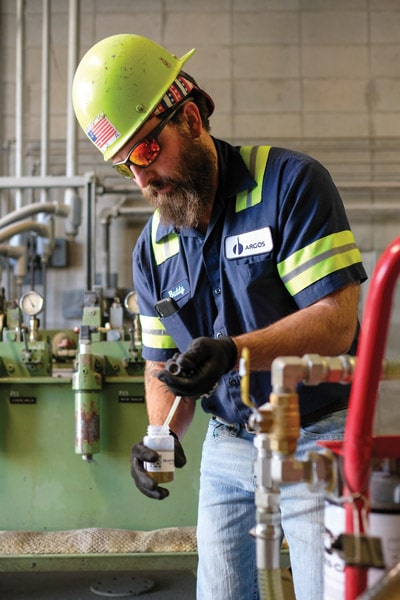Outsourcing activities considered non-core is an ever-growing trend among companies. Jobs like sanitation, security, facilities maintenance, and lubrication management are commonly being handled by external companies. But is contracting lubrication out really the best strategy? It can be, but there are a few things to consider before you make the decision.
Why Outsource Lubrication Work?
Many plants today are struggling to fill key positions in their maintenance and reliability teams. While investing in attracting and keeping skilled workers across many disciplines may serve as a long-term strategy, it is not a solution to more immediate problems. Outsourcing labor can bring skilled work into the plant more quickly, allowing you to get a bad lubrication program back on track or identify chronic failure problems that may be rooted in lubrication problems. Still, there are many ways it can go wrong.
Common Problems with Contract Lubrication Workers
Contracting lubrication work to skilled technicians can bring immense benefits, but it’s important to remember that lubrication tasks do not happen in a vacuum. Without the right plan or an experienced partner who understands what you’re trying to accomplish, you may find yourself paying a premium for outsourced work that produces very little tangible results.
Focusing on the Wrong Costs
One of the biggest benefits of choosing to outsource labor is increased access to a range of skilled workers. Some plants miss out on this benefit by accepting lower-cost general maintenance workers or even unskilled labor for roles that have a major impact on machine reliability and therefore overall profitability.
Lubrication technician roles are a common place where plants tend to compromise on skills in the interest of cost. Unfortunately, rather than base the decision to outsource on “increased precision per unit time” (how can I improve the effectiveness of this lubrication program?), many plants focus on “cost per unit time” (how much does the lubrication program cost to staff?).
A general contractor can sense when “lowering overhead costs” is the dominant driving factor for outsourcing and may compromise on technician skill levels to snatch up a competitive bid. While it may seem cheaper to hire a low-skilled worker to handle lube tasks, poor lubrication practices breed problems expensive enough to easily dwarf labor cost differences between skilled and unskilled workers.
When you decide to outsource labor, you have access to a marketplace of labor options that include highly skilled workers in a variety of fields. Using that access, it is possible to reduce overhead and right-size staffing levels with skilled workers who can properly care for your machine assets.
Ignoring Contamination Factors
Another common issue when it comes to contract lubrication technicians is assuming that adding a lubrication-focused technician alone can solve chronic failure problems related to contamination. While a skilled lubrication worker can certainly mitigate contamination, more support may be needed to truly solve underlying problems.
Consider this example: a company’s poor fluid cleanliness led to significant reductions in asset availability. Poor storage and handling practices coupled with poor equipment configuration and particularly bad breather and filter design led to significant downtime and reduced valve and hydraulic pump life. The company knew poor lubrication was the primary cause of most of their problems and hoped that outsourcing the lube program would correct these issues.
They contracted an inexperienced general maintenance technician who performed lubrication tasks and inspections on time according to internal procedures and guidelines. But still, equipment failures were not reduced. At that point, they could complain to the labor supplier, but since the contract worker was performing duties as instructed, replacing that worker with a new one would likely yield the same results.
In this case, it is likely that contamination problems were not being properly addressed by simply adding an extra technician. What the company needed was a partner who could not only supply skilled lubrication labor, but could also offer insight and lubrication services to support that worker and enable them to identify and correct the root problems they were brought in to solve.


Missing Detailed Lubrication Procedures
Lack of proper procedures for lubrication can also be a major reason that a contract lubrication technician project fails to deliver results.
Consider another example: a company’s imprecise greasing saw reductions in motor bearing life. Reports from the motor rebuild shop pointed to evidence of overgreasing (grease in the windings). So the company hired contract lube techs to turn their program around. Just as with the first example, outsourcing to non-lubrication engineers (which is likely due attempts to minimize costs) won’t see the creation of precise processes or thorough detailed job plans and procedures — in other words, what you actually need to fix your program issues. Contracting technicians with experience who have the experience and support to identify procedural problems and help you make a plan to solve them will yield a much greater return on your investment in your facility’s profitability and efficiency
Find a Partner you can Trust
No single act will improve a poorly structured lubrication program. Outsourcing lubrication can certainly help solve problems, but it requires a skilled contract worker with external support from an experienced provider to make a real impact. While skillset and motivation play a role in a contract lube tech’s impact, a good tech facing a flawed program with no support is about as useful as a bad tech.
Choosing a specialized contractor with experience is the best way to ensure that your contract labor investment gets results. IFM‘s lubrication technician services take a turn-key approach, working closely with your maintenance, engineering, safety, and procurement teams to identify problems and find holistic solutions. We will develop a plan and detailed proposal including all equipment, training, software, PPE, and personnel needed to implement and maintain a world-class lubrication program designed to improve reliability and lower maintenance costs through better lubrication.
